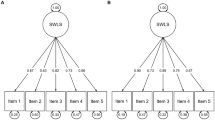Abstract
The reliability and validity of a patient-administered version of the Behavior and Symptom Identification Scale (BASIS-32) was compared to the original interviewer-administered version. The construct validity of BASIS-32 subscales was assessed by examining their relationship with functional and satisfaction quality of life and physician ratings of functional and clinical status. A total of 361 acute psychiatric inpatients were given a self-administered BASIS-32, nurse-administered Lehman's Quality of Life Interview (QOLI), and Psychiatrist Assessment Form at admission and discharge. The original factor structure, internal consistency reliability, discriminant validity, and sensitivity to change were replicated. The patient-administered BASIS-32 is equally as reliable and valid as the interview. Construct validity analyses revealed that functional and satisfaction QOLI indices were moderately related to the BASIS-32 in the hypothesized directions. All satisfaction scales were associated with significantly less severity. Physician ratings were only mildly related to the subscales. The BASIS-32 used in outcome assessments with inpatients provides important and unique perspectives on functional and clinical status that are not tapped by clinician-rated assessments.
Similar content being viewed by others
References
Eisen SV, Grob MC, Dill, DL: Outcome measurement: Tapping the patient's perspective. In: Mirin SM, Gossett JT, Grob MC (Eds.):Psychiatric Treatment: Advances in Outcome Research. Washington, DC: American Psychiatric Press, 1991, pp. 213–235.
Eisen SV, Dill DL, Grob MC: Reliability and validity of a brief patient-report instrument for psychiatric outcome evaluation.Hospital and Community Psychiatry 1994; 45: 242–247.
Bailey J, Coppen A: A comparison between the Hamilton rating scale and the Beck inventory in the measurement of depression.British Journal of Psychiatry 1976; 128: 486–489.
Castrogiovanni P, Maremmani I, Deltito JA: Discordance of self ratings versus observer ratings in the improvement of depression: Role of locus of control and aggressive behavior.Comprehensive Psychiatry 1989; 39: 231–235.
Kass F, Charles E, Klein DF, et al.: Discordance between the SCL-90 and therapists' psychopathology ratings: Implications for clinical assessment.Archives of General Psychiatry 1983; 40: 389–393.
Lindenmayer JP, Kay SR, Plutchik R: Multivantaged assessment of depression in schizophrenia.Psychiatry Research 1992; 42: 199–207.
Piersma HL, Boes JL: Agreement between patient self-report and clinician rating: Concurrence between the BSI and the GAF among psychiatric inpatients.Journal of Clinical Psychiatry 1995; 51: 153–157.
Shrauger JS, Osberg TM: The relative accuracy of self-predictions and judgments by others in psychological assessment.Psychological Bulletin 1981; 90: 322–351.
Tondo L, Burrai C, Scamonatti L, et al.: Comparison between clinician-rated and self-reported depressive symptoms in Italian psychiatric patients.Neuropsychobiology 1988; 19: 1–5.
Hughes JR, O’Hara MW, Rehm LP: Measurement of depression in clinical trials: An overview.Journal Clinical Psychiatry 1982; 43: 85–88.
Roy-Byrne P, Dagadakis C, Ries R, et al.: A psychiatrist-rated battery of measures for assessing the clinical status of psychiatric inpatients.Psychiatric Services 1995; 46: 347–352.
Bigelow LB, Berthot BD: The psychiatric symptom assessment scale.Psychopharmacology Bulletin 1989; 25: 168–179.
Lehman AF: The well-being of chronic mental patients: Assessing quality of life.Archives of General Psychiatry 1983; 40: 369–373.
Lehman AF: A quality of life interview for the chronically mentally ill.Evaluation and Program Planning 1988; 11: 51–62.
Folstein MF, Folstein E, McHugh PR: Mini-Mental State: A practical method for grading the cognitive state of patients for the clinician.Journal of Psychiatric Research 1975; 12:189–198.
Roy-Byrne PP, Dagadakis C, Unitzer J, et al.: Evidence for limited validity of the revised GAF/SOFAS.Psychiatric Services 1996; 47: 864–866.
American Psychiatric Association:Diagnostic and Statistical Manual of Mental Disorders. Fourth ed. Washington, DC: APA Press, 1994.
Russo J, Roy-Byrne P, Reeder D, et al.: Longitudinal assessment of quality of life in acute psychiatric inpatients: Reliability and validity.Journal of Nervous and Mental Diseases 1997; 185: 166–175.
Harmon H:Modern Factor Analysis. Chicago: University of Chicago Press, 1976.
Parkerson GR, Broadhead WE, Tse CK: Quality of life and functional health of primary care patients.Journal of Clinical Epidemiology 1992; 45: 1303–1313.
Delbanco TL: Enriching the doctor-patient relationship by inviting the patient's perspective.Annals of Internal Medicine 1992; 116: 414–418.
Author information
Authors and Affiliations
Rights and permissions
About this article
Cite this article
Russo, J., Roy-Byrne, P., Jaffe, C. et al. The relationship of patient-administered outcome assessments to quality of life and physician ratings: Validity of the BASIS-32. The Journal of Mental Health Administration 24, 200–214 (1997). https://doi.org/10.1007/BF02898514
Issue Date:
DOI: https://doi.org/10.1007/BF02898514




